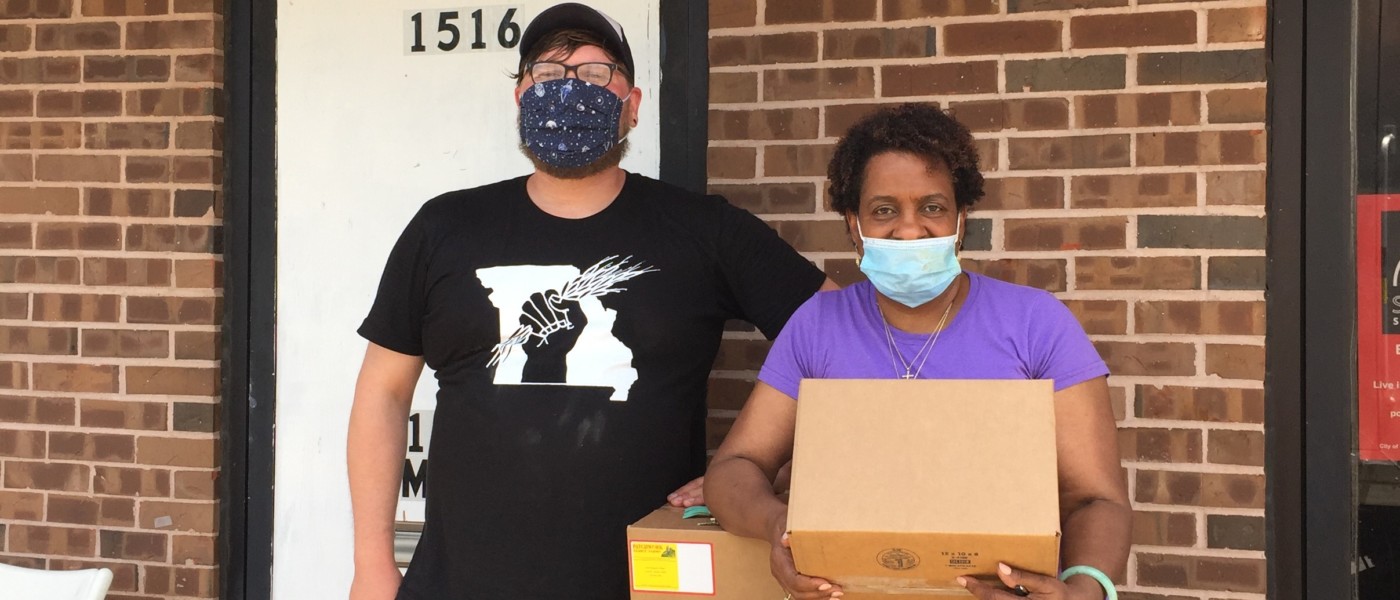The Q&A below is with Tim Gibbons, the Communications Director at one of our long-time partners: Missouri Rural Crisis Center (MRCC). Tim describes MRCC’s COVID-19 response and talks about some positives that have arisen.
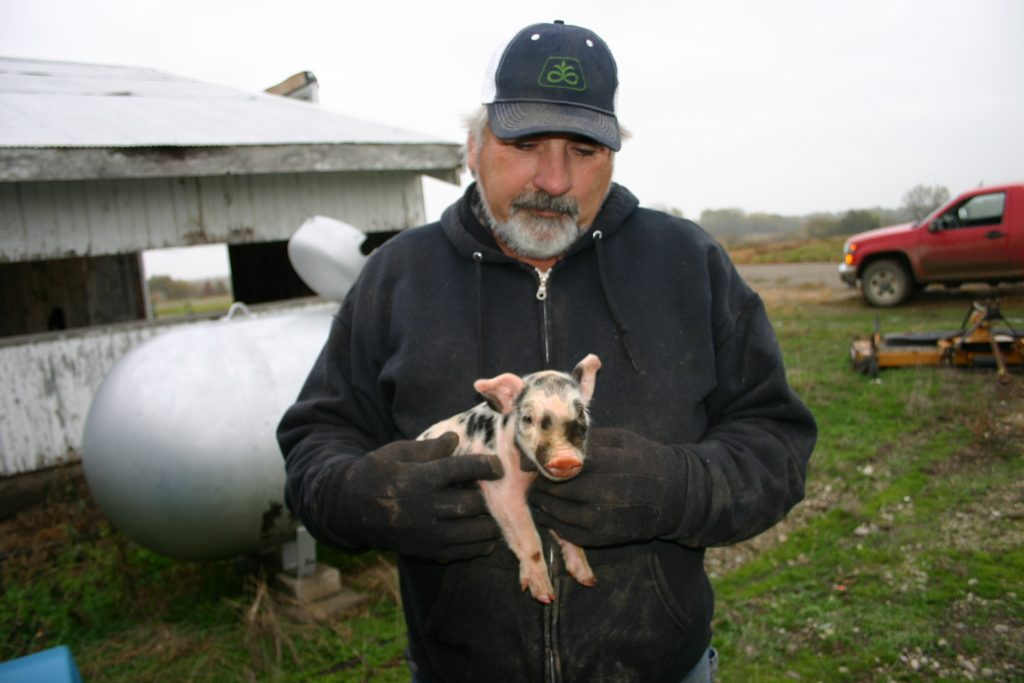
Patchwork Family Farms raises hogs the traditional way – Patchwork Family Farms member producer John Storm on his farm.
Farm Aid: What were the impacts of COVID-19 on your farm community that pushed you to act?
Tim Gibbons: MRCC is a statewide farm and rural membership organization that was formed out of the farm crisis of the 80s, just like Farm Aid. We work to support family farms and rural communities, and one of our programs is Patchwork Family Farms, a cooperative of independent family farm hog producers that raise hogs the traditional way. When the crisis hit, we saw an opportunity to organize and help people locally, in Missouri and across the country.
For us, it was a chance to increase the amount of family farm meat we could provide for people in need, buy more hogs from family farmers and support the local food infrastructure, while also highlighting the serious and vital shortfalls of the corporate model of livestock production. We are seeing that, yet again, corporate control of the livestock industry is not good for family farms, our communities and consumers, both during “normal times” and during times of crisis.
Farm Aid: What did you do – what were your first steps? How long did it take to get your new effort/model up and running?
Tim Gibbons: We saw local restaurants closing and laying off their staff, and we knew we could immediately provide family farm pork to those families. They have supported us, our members and producers for decades, and the least we could do was give them something back right away. We initially thought we would be distributing around 200 boxes (with 7 pounds of Patchwork Family Farms pork in each box), but since the need was so great, we ended up giving away over 400 boxes, and that’s nearly 3,000 pounds of family farm pork. The response from our mid-Missouri community was huge.
And, that’s one “silver lining” during this whole pandemic, local people and local businesses are really standing up powerfully to do what we can all do together to help each other. We have seen a lot of projects and a lot of people thinking outside the box. It really highlights the drastic and stark differences between the corporate and the local model.
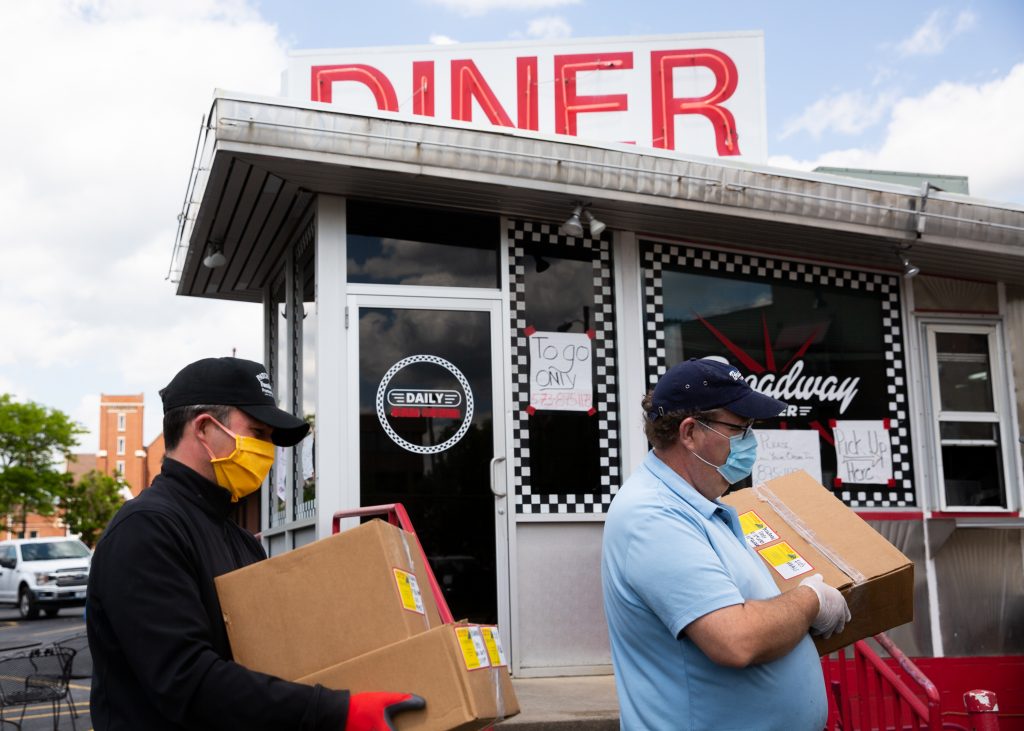
Patchwork Family Farms delivering pork to Dave Johnson and the Broadway Diner in support of their free meals to kids program.
Local foundations saw what we were doing, and the Veterans United Foundation and Heart of Missouri United Way wanted to help us do more. So we partnered with two local restaurants, the Broadway Diner and the Broadway Brewery & Restaurant. The Broadway Diner was already giving away free meals to kids in need, and we were able to add family farm pork to those meals. One of the owners of the Broadway Brewery is a long-time MRCC member and farmer, and we set up a program where people that were un- or underemployed could pick up a free dinner for themselves and their families. Through the Broadway Brewery alone, we distributed more than 850 hot meals for families who needed good family farm raised food. It supported family farmers producing for local markets, the restaurants themselves and their workers too, which is so important because local food restaurants are critical to local food systems.
We also applied for the USDA Farmers to Families Food Box program and we received a contract. During the first run, we were about to give away 1250 family farm pork boxes out to partners in urban St Louis, specifically organizations that serve people of color, as well as food banks and local food co-ops in St. Louis and mid-Missouri. Again, that money helped us support local hog producers and the local food infrastructure.
Our communities are filled with strong, smart and powerful people. MRCC is working to organize that power to make lasting change now and into the future.
Farm Aid: What has been the reaction to your COVID-motivated work?
Tim Gibbons: It’s been huge. The important thing is to stand up and help people in need, and listen and build together a situation where we know “we’re going to get through this together.” Our communities are filled with strong, smart and powerful people. MRCC is working to organize that power to make lasting change now and into the future.
COVID is spotlighting the ways that the corporate controlled food system is damaging our farmers, our communities, our democracy and our national security. When we distribute Patchwork Family Farms pork, we work to make sure that there’s a message about that corporate system with it too—our pork is a tool for organizing people to claim back their power.
Another “silver lining” is that a lot of the people we’re connecting with now are not our usual customers. And when they taste family farm pork, they’re pretty amazed. We talk to them about the way our pork is raised versus the corporate model with its indoor barns and massive lagoons of manure. Our hogs are raised outdoors, with fresh air and sunshine; and that hugely impacts the taste.
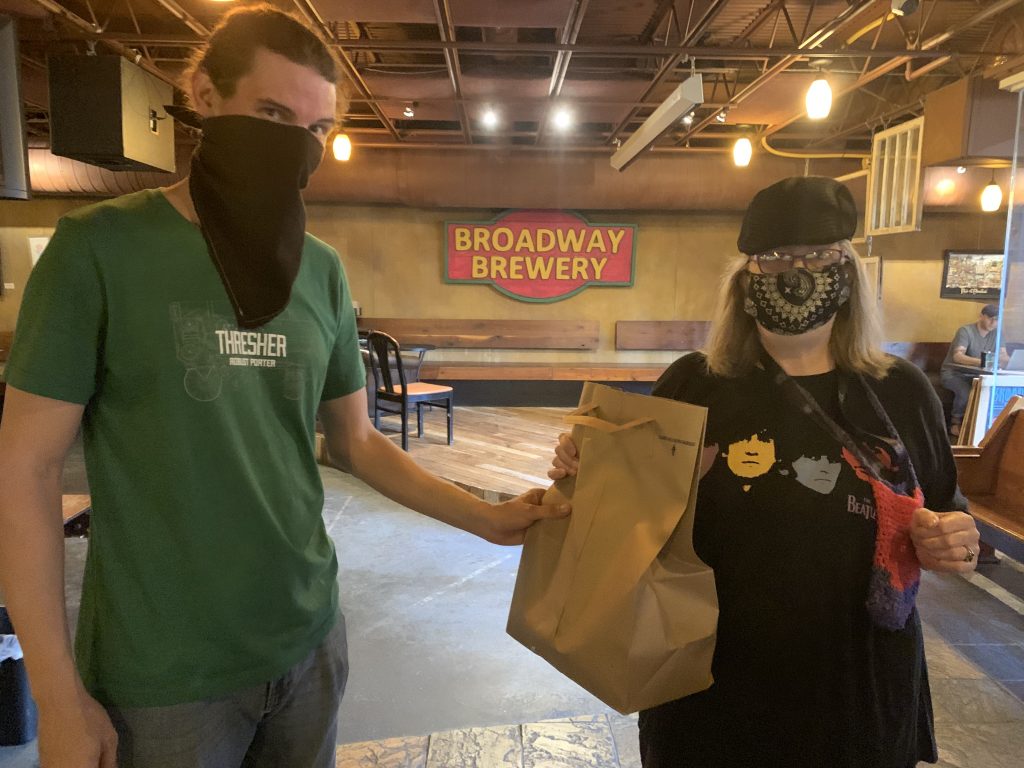
Christine Carrier picked up food from our local food hot meal program at the Broadway Brewery & Restaurant to help her during the COVID pandemic. Christine said: “With all this uncertainty, a kind gesture, a kind word, an unexpected hot meal, mean so much. Thank you for everything you folks do. Stay safe, and may God bless.”
Farm Aid: Has Patchwork Family Farms been affected at all by the backups on the meat processing side of things?
Tim Gibbons: Over the last 30 years, nearly 90% of Missouri’s and 90% of our country’s hog producers have been put out of business because of the corporate takeover of the hog market. In Missouri, we’ve lost more than 20,000 hog producers in a few decades (23,000 in 1985; 2,687 in 2017). The corporate takeover didn’t just negatively impact family farmers, it also impacted our rural Main Streets across our state and country. We lost thousands of independent meat packing plants with the loss of independent family farmers. Because the number of local processing plants are now so few, many independent farmers are having a hard time getting slots at the existing plants. Some are scheduling out to 2021. Luckily for Patchwork, we have dates scheduled into the future and we’re bringing in more hogs than ever. That comes from long relationships and the trust that we’ve built over many years. That’s the local food system showing its resiliency.
One positive impact of COVID is that people are trying to purchase their meat locally. A lot of that is driven by a fear of food shortages. But we don’t actually have a meat shortage in this country, contrary to what you might hear. The U.S. has large supplies of meat in storage, and the corporations have been continuing to ship a historic amounts of the pork produced here to China (A recent New York Times article states that pork exports to China rose 590 percent from a year earlier, reaching their highest level since at least 2009.). Another reason people are seeking out local meat is their concern about those meat packing facilities and the dangers meat processing facility workers are facing during COVID—with few protections to keep them safe in their job during regular times and especially now during COVID. We have been working with Alex Fuentes of the Rural Community Workers Alliance to lift up their voices organizing for safer workplaces for meat processing workers in Missouri and across our country.
Now we are working creatively about how we can organize—we have to continue to break down the divisive corporate narrative that divides us and allows corporations to centrally control our democratic process and food system, while both urban and rural people suffer.
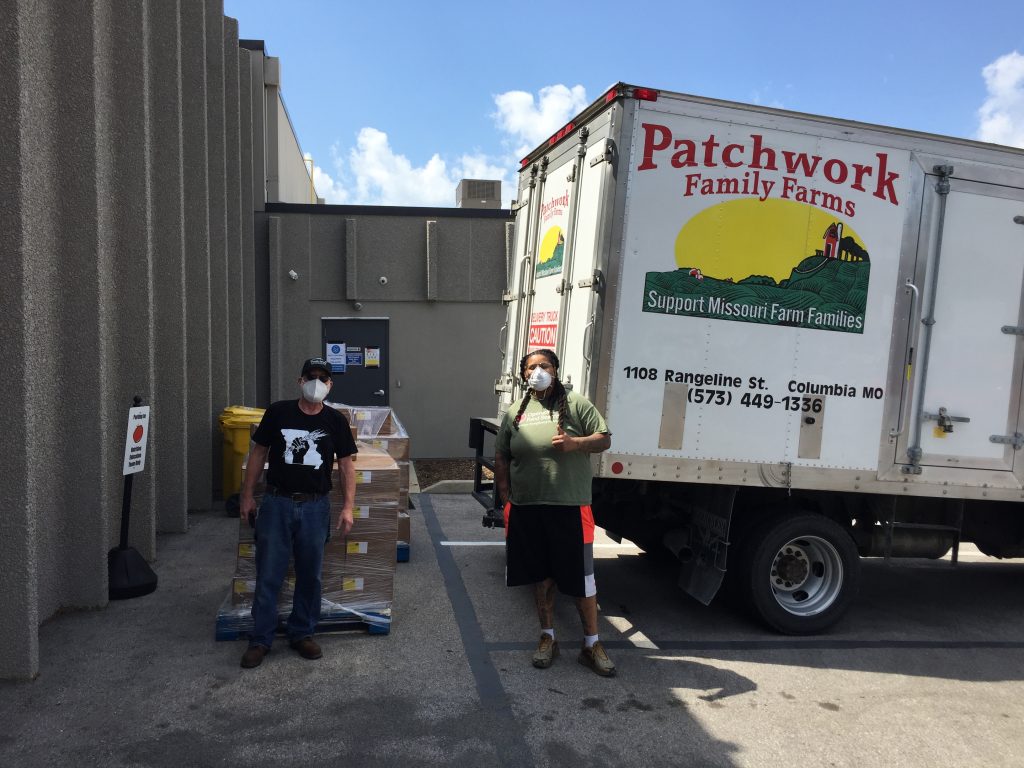
MRCC and Patchwork Family Farms delivers family farm pork to the mid-MO and St. Louis Food Banks through the USDA Farm to Families relief program.
Farm Aid: As a farm advocate, what is one thing you want eaters to know right now?
Tim Gibbons: Farmers and rural economies are in a depression. Things were bad before the trade war; they were bad before COVID; and they are really bad right now. Prices are low, meanwhile grocery store prices are up. We need to demand policies that support a diversified and decentralized farm and food system. We need diverse ownership of the land, to ensure the sustainability of farm families and for environmental protection and the protection of our democracy. For years, the main policy driver for our food system, the Farm Bill, has been largely written by the corporations themselves and perpetuates a system that benefits them at the expense of family farms and consumers. This crisis has spotlighted the need for change in the farm and food system so that farmers—and all of us—can have prosperity.

